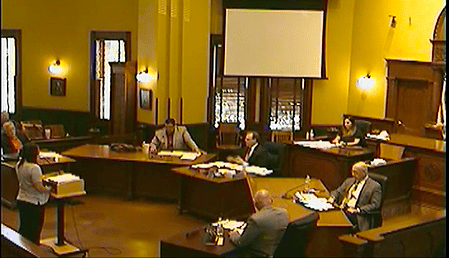As local governments across the state are looking for ways to spend huge windfalls of federal cash earmarked for Chinese coronavirus relief, officials in one North Texas county said “no” to taking the taxpayer money until they find out what “strings” are attached.
Ellis County commissioners voted unanimously last week to delay accepting grant funds under Congress’ $2 trillion Coronavirus Aid, Relief, and Economic Security (CARES) Act after constituents said they were worried that taking the money might obligate the county to implement invasive contact tracing.
“I do not believe, nor am I familiar with, any one local government adopting part of a federal grant and then trying to avoid the other implications of the act,” Commissioner Paul Perry told Texas Scorecard following the decision. “Federal money comes with strings.”
Texas received a total of $11 billion in CARES Act money to help with COVID-19 recovery efforts as part of the federal stimulus act’s $150 billion Coronavirus Relief Fund.
Eighteen of Texas’ largest cities and counties (with populations above 500,000) received cash directly from the U.S. Treasury. The rest must access their share of the CRF grant money through the state.
Once localities accept the grant, they receive 20 percent of their allotment—$55 per resident—upfront and the remainder as expense reimbursements that must be documented with receipts.
Ellis County, located just south of Dallas, was allocated $3.46 million. If commissioners approve, $692,000 will be deposited immediately into the county’s bank account to start spending on eligible expenses.
The CARES Act says Coronavirus Relief Fund cash can only be spent on “necessary expenditures incurred due to the public health emergency” between March 1 and the end of 2020.
The money cannot be spent on items already included in the county’s budget. Any unspent funds will be returned to the U.S. Treasury.
Questions arose ahead of the commissioners court meeting, prompted by a separate allotment of CARES Act funds being provided by the CDC to state and local health departments specifically for coronavirus testing and contact tracing.
“There is no such thing as ‘free’ money, and almost all federal grants come with stipulations,” said Ellis County resident Kathy Ponce.
Like many Texans, Ponce is skeptical about the state’s plans to ramp up contact tracing in response to the coronavirus outbreak and spend $295 million on an army of call-center employees to track citizens.
The conservative activist told Texas Scorecard she saw the CARES Act grant proposal on the commissioners court agenda and shared her concerns with her elected officials in advance of the June 2 meeting.
“Lawmakers have been trained to take grant money,” Ponce said. “Activists are trained to know that about 98 percent of grant money has strings attached.”
During the meeting, Emergency Management Coordinator Samantha Pickett told commissioners the CRF acceptance document she was asking them to sign did not contain any stipulations that the county would have to abide by any federal or state rules for contact tracing.
“We don’t actually do contact tracing as a county government because we don’t have a department of health,” said County Judge Todd Little.
Little said the Texas Department of State Health Services (DSHS) does do contact tracing for Ellis County—for the coronavirus and all other tracked diseases—and uses the National Electronic Disease Surveillance System to send case information to a nationwide database.
Patient participation in contact tracing is voluntary, and DSHS says their system does not currently include any type of cell phone tracking application.
“It’s a slippery slope,” said Perry. “The term ‘contact tracing’ doesn’t scare me; what does is the technology that goes along with it, and does the contact tracing ever stop.”
“It’s never bad business for a conservative not to take federal money,” he added.
Little said the county does not have to accept the federal taxpayer money and didn’t have to decide that day.
Commissioners decided to table the matter until they could confirm what conditions, if any, are attached to the relief funds.
A day before the county met, Waxahachie City Council Member Melissa Olson cast the lone “no” vote against the city accepting coronavirus cash.
Waxahachie is the Ellis County seat and home to about 40,000 of the county’s 185,000 residents. The city was allotted $2.1 million in coronavirus relief funds.
“I just want to be sure that if we accept federal/state aid that we don’t have to implement procedures such as contact tracing,” Olson said prior to the city’s June 1 vote.
Ponce commended Olson for her vote and said she was pleased that commissioners temporarily tabled action on the grant.
“That is not an easy task to do when the figure is $3 million,” she told Texas Scorecard. “Understanding the loss of freedoms is one of the greatest tools we can use to educate our elected officials on just how bad many grants truly are.”
A list of Coronavirus Relief Fund allocations being directed by the state to Texas counties and cities can be found here. CRF allocations made directly from the Treasury to state and local governments are listed here.





